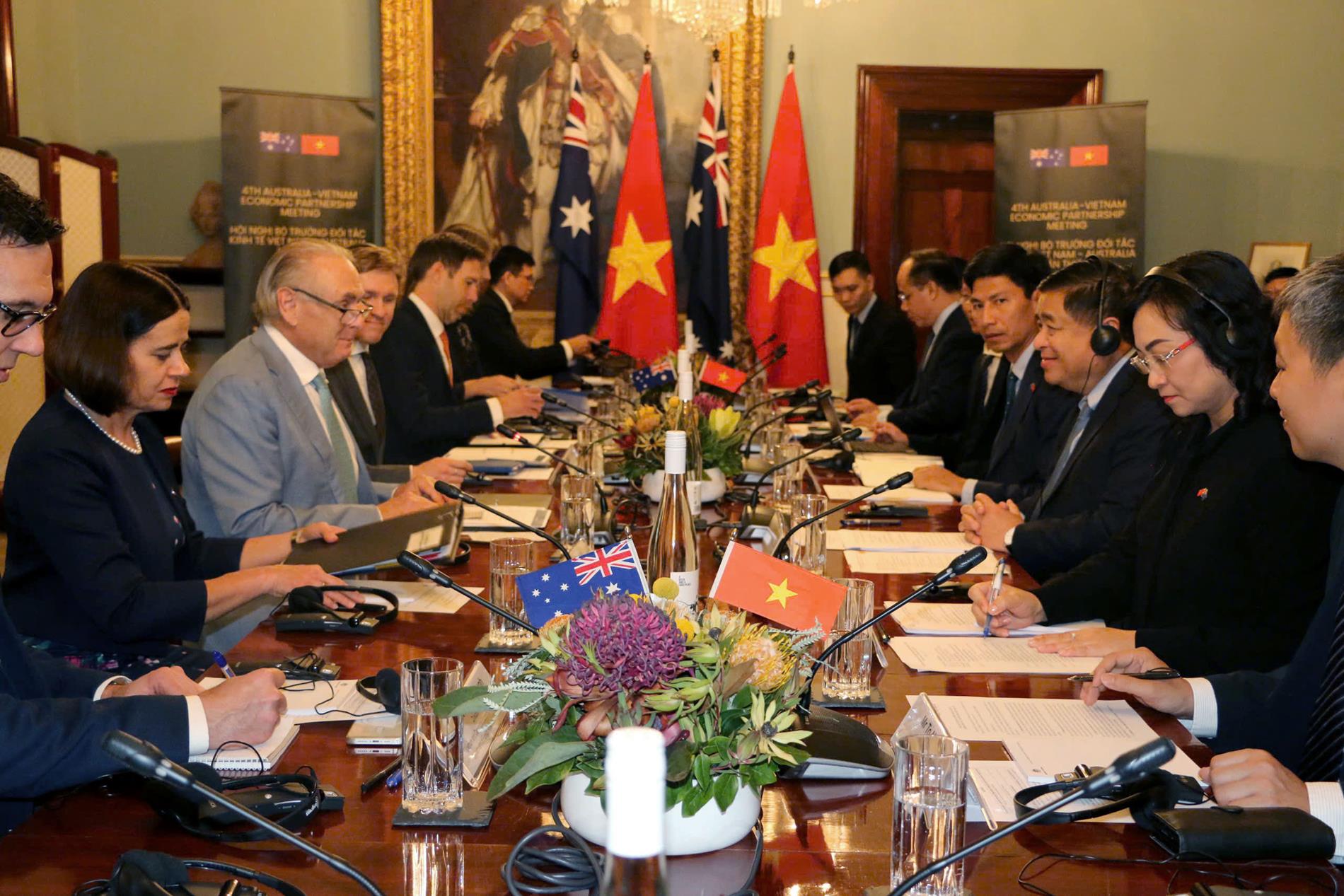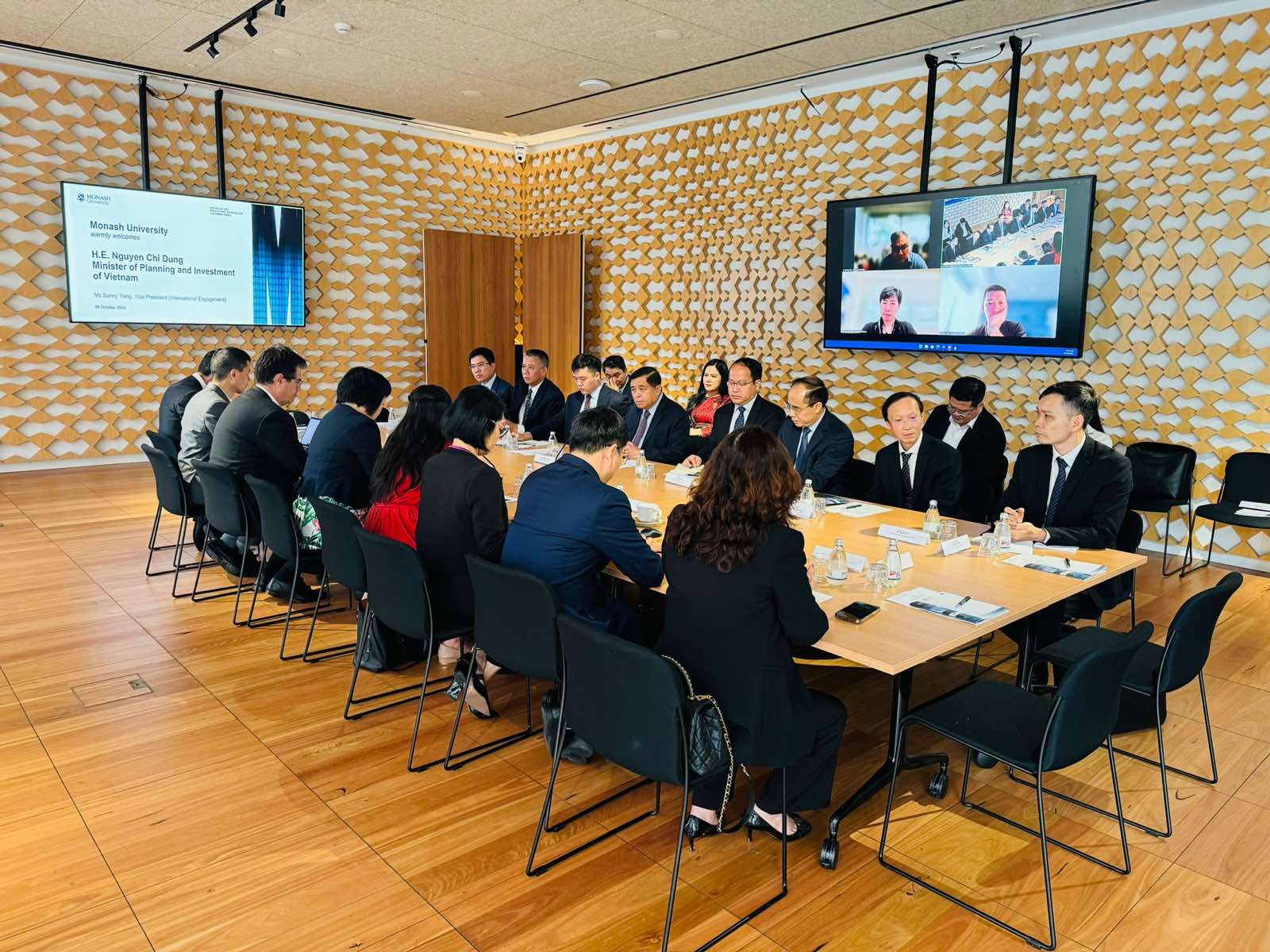(MPI) - Vietnamese Minister of Planning and Investment Nguyen Chi Dung and Australian Minister for Trade and Tourism Don Farrell co-chaired the fourth Australia - Vietnam Economic Partnership Meeting in Adelaide, Australia on October 17.
 |
| The Vietnam - Australia fourth economic partnership meeting. Photo: MPI |
The meeting followed the recent upgrade of the two countries’ relationship to a Comprehensive Strategic Partnership during Prime Minister Pham Minh Chinh's official visit to Australia in March 2024.
The economic partnership between Vietnam and Australia has continued to flourish this year. With the upgrade of the relationship, the two countries have become each other’s key economic partners in various areas, including trade, investment, development cooperation, agriculture, and education and training.
Regarding official development assistance (ODA), Australia is one of the largest ODA providers for Vietnam with the funding amounting to 95 million AUD in the 2023-2024 period, according to the Australian Embassy in Vietnam, mainly in areas such as economic growth, skilled workforce development, energy and climate, and gender equality.
For foreign direct investment (FDI), Australia has run 660 valid projects worth about 2.06 billion USD in Vietnam with a focus on processing and manufacturing industry, accommodation and food services, and agriculture, forestry and fisheries, making it rank 21st out of 149 countries and territories investment in the country.
Two-way trade hit 10.8 billion USD in the first nine months of this year, up 5.6% year-on-year, of which Vietnam’s exports to Australia were 5 billion USD, up 30.3% year-on-year, mainly in the areas like machinery, equipment, footwear, textiles, seafood, and iron and steel; its imports, including coal, wheat, and raw materials, were 5.8 billion USD, down 9.3% year-on-year. Vietnam’s trade deficit reached 777 million USD, 69.5% decrease as compared to 2023.
In education and training, Vietnam was the fifth-largest source of international students in Australia, with 36,221 Vietnamese students enrolling at Australian educational facilities as of August 31.
At the meeting, the two sides discussed measures to further promote bilateral economic cooperation, and assessed the implementation of the Enhanced Economic Engagement Strategy (EEES) as well as outcomes of the working groups on ODA, FDI, and trade, and updates on pioneering enterprise initiatives.
They also exchanged opportunities for collaboration at multilateral and regional forums, such as the Association of Southeast Asian Nations (ASEAN), the Asia-Pacific Economic Cooperation (APEC), the World Trade Organisation (WTO), the Regional Comprehensive Economic Partnership (RCEP), the Comprehensive and Progressive Agreement for Trans-Pacific Partnership (CPTPP), the ASEAN-Australia-New Zealand Free Trade Area (AANZFTA), and the Indo-Pacific Economic Framework for Prosperity (IPEF).
The fourth economic partnership meeting was held successfully, unlocking new development orientations for Vietnam-Australia cooperation in the time ahead. Both sides agreed to hold the fifth ones in Vietnam to review the implementation progress of the EEES and agreements reached in the previous meeting, and propose new initiatives and cooperation agreements.
 |
| Photo: MPI |
As part of his working trip to Australia and and co-chairing the Vietnam-Australia fourth economic partnership meeting, Minister Nguyen Chi Dung hold a working session with authorities from Australia’s Victoria state to boost investment cooperation in such fields as innovation and high-quality human resources in technology, artificial intelligence (AI) and semiconductors.
Minister Dung stressed that the upgrade of the Vietnam - Australia relationship to a Comprehensive Strategic Partnership recently has put cooperation priorities in innovation, sci-tech, and highly-skilled workforce development.
“Vietnam hopes to enhance bilateral investment with Australia in potential sectors like green economy, digital economy, education, digital transformation, circular economy, hi-tech agriculture, and renewable and new energy. The country will always provide the best conditions for enterprises, including those from Victoria state, to invest and do business”, the minister said.
Paul Hammer, Victoria state’s senior leader, praised Vietnam’s socio-economic progress as well as its potential in human resources, stressing that the state boats huge advantages in education and training.
Victoria looks forward to continuing strengthening the economic cooperation with Vietnam, and pledges to assisting Vietnam in developing semiconductor and AI ecosystems, Hammer said.
On the same day, Minister Dung also met with representatives of the University of Melbourne and Monash University. He hailed the two institutions as the world-leading in innovation and hi-tech, and called for partnership in training, incubation, and human resource development for the AI and semiconductor industries in Vietnam. The minister also visited the Melbourne Connect Innovation Centre placed at the University of Melbourne, one of Australia’s leading innovation hubs.
The visit opened considerable opportunities for Melbourne Connect and Vietnam’s National Innovation Centre (NIC) in innovation activities like enhancing innovation capacity, training, incubation, consulting and exchanging startups with NIC./.
Bao Linh
Ministry of Planning and Investment